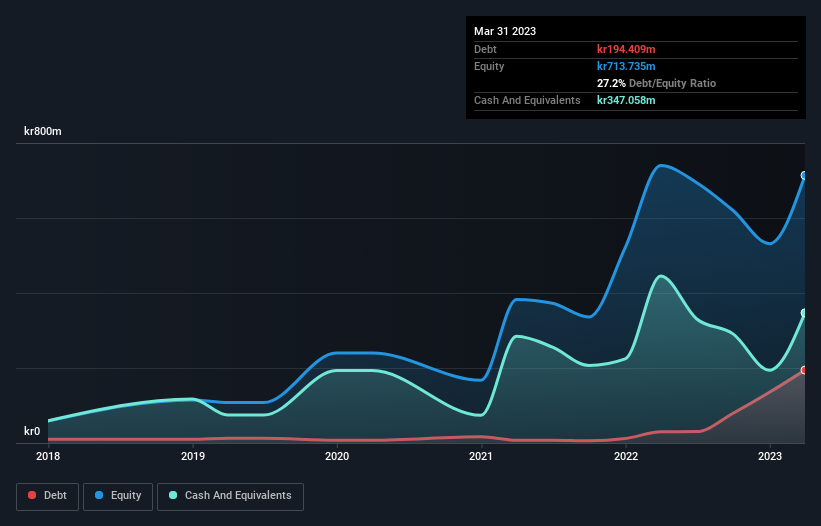
David Iben put it well when he said, 'Volatility is not a risk we care about. What we care about is avoiding the permanent loss of capital.' It's only natural to consider a company's balance sheet when you examine how risky it is, since debt is often involved when a business collapses. As with many other companies Otovo ASA (OB:OTOVO) makes use of debt. But is this debt a concern to shareholders?
When Is Debt A Problem?
Debt and other liabilities become risky for a business when it cannot easily fulfill those obligations, either with free cash flow or by raising capital at an attractive price. Part and parcel of capitalism is the process of 'creative destruction' where failed businesses are mercilessly liquidated by their bankers. However, a more frequent (but still costly) occurrence is where a company must issue shares at bargain-basement prices, permanently diluting shareholders, just to shore up its balance sheet. Of course, debt can be an important tool in businesses, particularly capital heavy businesses. When we examine debt levels, we first consider both cash and debt levels, together.
View our latest analysis for Otovo
How Much Debt Does Otovo Carry?
The image below, which you can click on for greater detail, shows that at March 2023 Otovo had debt of kr194.4m, up from kr30.0m in one year. But it also has kr347.1m in cash to offset that, meaning it has kr152.6m net cash.

A Look At Otovo's Liabilities
The latest balance sheet data shows that Otovo had liabilities of kr311.1m due within a year, and liabilities of kr206.2m falling due after that. Offsetting this, it had kr347.1m in cash and kr295.2m in receivables that were due within 12 months. So it can boast kr124.9m more liquid assets than total liabilities.
This short term liquidity is a sign that Otovo could probably pay off its debt with ease, as its balance sheet is far from stretched. Simply put, the fact that Otovo has more cash than debt is arguably a good indication that it can manage its debt safely. The balance sheet is clearly the area to focus on when you are analysing debt. But it is future earnings, more than anything, that will determine Otovo's ability to maintain a healthy balance sheet going forward. So if you want to see what the professionals think, you might find this free report on analyst profit forecasts to be interesting.
Over 12 months, Otovo reported revenue of kr803m, which is a gain of 125%, although it did not report any earnings before interest and tax. So there's no doubt that shareholders are cheering for growth
So How Risky Is Otovo?
Statistically speaking companies that lose money are riskier than those that make money. And the fact is that over the last twelve months Otovo lost money at the earnings before interest and tax (EBIT) line. And over the same period it saw negative free cash outflow of kr507m and booked a kr287m accounting loss. Given it only has net cash of kr152.6m, the company may need to raise more capital if it doesn't reach break-even soon. The good news for shareholders is that Otovo has dazzling revenue growth, so there's a very good chance it can boost its free cash flow in the years to come. High growth pre-profit companies may well be risky, but they can also offer great rewards. When analysing debt levels, the balance sheet is the obvious place to start. However, not all investment risk resides within the balance sheet - far from it. For example Otovo has 3 warning signs (and 1 which doesn't sit too well with us) we think you should know about.
At the end of the day, it's often better to focus on companies that are free from net debt. You can access our special list of such companies (all with a track record of profit growth). It's free.
New: AI Stock Screener & Alerts
Our new AI Stock Screener scans the market every day to uncover opportunities.
• Dividend Powerhouses (3%+ Yield)
• Undervalued Small Caps with Insider Buying
• High growth Tech and AI Companies
Or build your own from over 50 metrics.
Have feedback on this article? Concerned about the content? Get in touch with us directly. Alternatively, email editorial-team (at) simplywallst.com.
This article by Simply Wall St is general in nature. We provide commentary based on historical data and analyst forecasts only using an unbiased methodology and our articles are not intended to be financial advice. It does not constitute a recommendation to buy or sell any stock, and does not take account of your objectives, or your financial situation. We aim to bring you long-term focused analysis driven by fundamental data. Note that our analysis may not factor in the latest price-sensitive company announcements or qualitative material. Simply Wall St has no position in any stocks mentioned.
About OB:OTOVO
Slight with mediocre balance sheet.
Market Insights
Community Narratives



